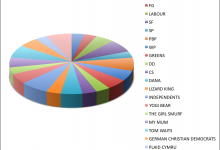The will of the people, adjusted for reality, approved by experts. It’s time for Technocracy Now!
Election 2011 is the most important political event in the history of the state. It provides the people of Ireland with the chance to play Bill Cullen and hire the best, those with the liathróidí, nimbleness and expertise to find different ways of telling us there is no alternative. Gavan Titley introduces Crisisjam’s election week celebration of technocracy, now.










